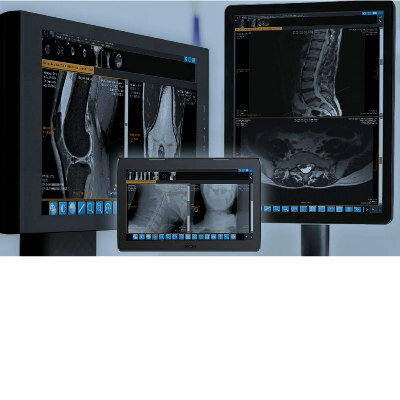3D MRI Technique Used to Diagnose Adult Autism
By MedImaging International staff writers
Posted on 31 Aug 2010
Scientists have developed a new method of diagnosing autism in adults. For the first time, a rapid brain scan that takes just 15 minutes can identify adults with autism with over 90% accuracy. The technique could lead to the screening for autism spectrum disorders in children in the future.Posted on 31 Aug 2010
The team, from the Institute of Psychiatry (IoP) at King's College London (UK), used a magnetic resonance imaging (MRI) scanner to capture images of the brain's gray matter. A separate imaging technique was then used to reconstruct these scans into three-dimensional (3D) images that could be assessed for structure, shape, and thickness--all intricate measurements that reveal autism spectrum disorder (ASD) at its root. By examining the complicated and subtle composition of gray matter in the brain, the scientists can use biologic markers, rather than personality traits, to assess whether or not an individual has ASD.
ASD is a lifelong and disabling disorder caused by abnormalities in brain development. It affects about 1% of the UK population (half a million people), the majority of these being men (4:1 male to female). Until now, diagnosis has mainly relied on personal accounts from friends or relatives close to the patient--a long and drawn-out process based on the reliability of this account and requiring a team of experts to interpret the data.
Dr. Christine Ecker, an IoP lecturer in the department of forensic and neurodevelopmental sciences, who led the study, said, "The value of this rapid and accurate tool to diagnose ASD is immense. It could help to alleviate the need for the emotional, time consuming and expensive diagnosis process, which ASD patients and families currently have to endure. We now look forward to testing if our methods can also help children.”
Prof. Declan Murphy, professor of psychiatry and brain maturation at the IoP, who supervised the research, said, "Simply being diagnosed means patients can take the next steps to get help and improve their quality of life. People with autism are affected in different ways; some can lead relatively independent lives while others need specialist support or are so severely affected they cannot communicate their feelings and frustrations at all. Clearly the ethical implications of scanning people who may not suspect they have autism needs to be handled carefully and sensitively as this technique becomes part of clinical practice.”
The research evaluated 20 healthy adults, 20 adults with ASD, and 19 adults with ADHD. All participants were males aged between 20 and 68 years. After first being diagnosed by traditional methods (an IQ test, psychiatric interview, physical examination, and blood test), scientists used the newly developed brain scanning technique as a comparison. The brain scan was highly effective in identifying individuals with autism and might therefore provide a rapid diagnostic instrument, using biologic hallmarks, to detect autism in the future.
The study was published August 2010 in the Journal of Neuroscience.
Related Links:
Institute of Psychiatry at King's College London














